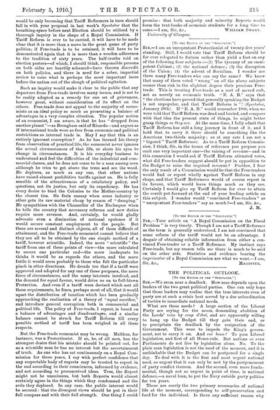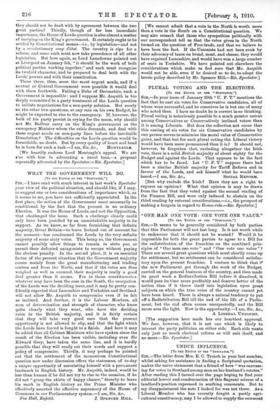THE POLITICAL OUTLOOK.
[TO THY EDITOR OF THY " SPECTATOR.":1,
SIR,—We seem near a deadlock. How near depends upon the leaders of the two great political parties. One can only hope that those leaders may realise that the true interests even of party are at such a crisis best served by a due subordination of tactics to immediate national needs.
What are these needs ? A large section of the Liberal Party are crying for the moon, demanding abolition of the Lords' veto by coup d'dtat, and are apparently willing to hang up the Budget till they gain their end, or to precipitate the deadlock by the resignation of the Government. This were to impede the King's govern- ment, not to carry it on. And cui bow° ? To pass Liberal legislation, and first of all Home-rule. But nations or even Parliaments do not live by legislation alone. No. To the plain man legislation is not the need of the moment, and it is unthinkable that the Budget can be postponed for a single day. To deal with it is the first and most urgent national need, so urgent that it can only be met by the postponement of party conflict thereon. And the second, even more funda- mental, though not so urgent in point of time, is national defence,—a naval loan, to put the Navy outside party politics for ten years.
These are surely the two primary necessaries of national life at the moment, corresponding to self-preservation and food for the individual. Is there any sufficient reason why
they should not be dealt with by agreement between the two great parties ? Thirdly, though of far less immediate importance, the House of Lords question is also almost a matter of carrying on the King's government. It certainly ought to be settled by Constitutional means—i.e., by legislation—and not by a revolutionary coup cretat. The country is ripe for a reform, and some such must now take precedence of all other legislation. But here again, as Lord Lansdowne pointed out at Liverpool on January 5th, "it should be the work of both political parties working together," and each must recognise Its twofold character, and be prepared to deal both with the Lords' powers and with their constitution.
These three, then, seem the most urgent needs, and if a neutral or Central Government were possible it would deal with them forthwith. Failing a Duke of Devonshire, such a Government is impossible : and I suppose Mr. Asquith is too deeply committed to a party treatment of the Lords question to initiate negotiations for a non-party solution. But surely en the other two questions, at any rate on his own Budget, he might. be expected to rise to the emergency. If, however, the bulk of his party persist in crying for the moon, why should not Mr. Balfour carry on the King's government as the emergency Minister whom the crisis demands, and deal with these urgent needs on non-party lines before the inevitable Dissolution ? The difficulties on the Lords question would be formidable, no doubt. But by every quality of heart and head he is born for such a task.—I am, Sir, &c., HONTEAGLI. [We heartily endorse Lord Monteagle's appeal. We are a'so with him in advocating a naval loan,—a proposal repeatedly advocated by the Spectator.—En. Spectator.]











































 Previous page
Previous page